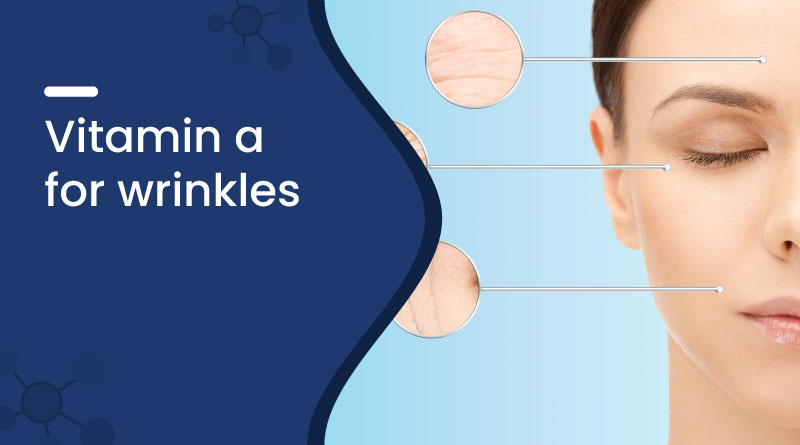Vitamin A for Wrinkles: Benefits, Uses & Anti-Aging Effects


Aging is natural, but wrinkles often make people look for effective solutions. Vitamin A is an essential nutrient known for its significant role in skin health. While it's known for supporting vision and immunity, it's also widely used in skincare. Vitamin A can improve skin texture, boost collagen, and reduce fine lines. Let’s see how it helps fight wrinkles.
What Is Vitamin A?
Vitamin A, a fat-soluble vitamin, comes in two forms:
- Retinoids (preformed Vitamin A) – Commonly found in animal products such as liver, eggs, and milk.
- Carotenoids (provitamin A) – Found in plant-based foods like carrots, sweet potatoes, and spinach.
Retinoids, especially retinol and tretinoin, are the most studied when it comes to skin health and wrinkle reduction.
How Vitamin A Helps Fight Wrinkles
- Boosts Collagen Production: It increases collagen formation. One of the key reasons for wrinkle formation is the decline of collagen, a protein that gives skin its firmness.
- Speeds Up Cell Turnover: Vitamin A encourages faster cell regeneration, which helps shed dead skin cells and replace them with new, healthier ones.
- Improves Skin Tone and Texture: Regular use of Vitamin A can lead to even-toned skin by fading hyperpigmentation, age spots, and blemishes. It also aids in clearing clogged pores, leading to smoother skin and better clarity.
- Reduces Sun Damage: While Vitamin A cannot replace sunscreen, it may help repair some of the damage caused by UV rays. Retinoids can fade sunspots and improve signs of photoaging, including roughness and fine lines.
- Enhances Skin Hydration: Some forms of Vitamin A improve the skin's moisture retention by strengthening the outer barrier. This helps reduce the appearance of fine lines caused by dehydration and keeps the skin flexible.
Sources of Vitamin A for Skin Health
1. Topical Retinoids
Topical forms like retinol, retinaldehyde, and tretinoin are commonly used in anti-aging creams. These are often recommended for mature skin or people noticing early signs of aging.
Zeelab provides the best solution for reducing wrinkles and other skin benefits through:
| Product | Key Features |
|---|---|
| Zeelab Retinol 1% Face Serum | Lessens fine lines, wrinkles, fades dark spots, and brightens the skin |
2. Dietary Sources
A balanced diet ensures your skin gets nutrients from within, complementing topical treatments. Incorporating Vitamin A-rich foods into your diet can also support skin health.
- Carrots
- Sweet potatoes
- Spinach
- Kale
- Eggs
- Liver
Precautions While Using Vitamin A
- Start Slow: When using topical retinoids, begin with a low concentration to avoid dryness or irritation.
- Avoid Mixing: Avoid combining with harsh exfoliants or strong acids unless advised by a dermatologist.
- Use Sunscreen: Retinoids can increase sun sensitivity; daily SPF is essential.
- Consult a Doctor: Pregnant or breastfeeding women should consult a healthcare provider before using Vitamin A supplements or retinoids.
Conclusion
Vitamin A is a powerhouse nutrient when it comes to wrinkle prevention and overall skin rejuvenation. Whether through food or topical retinoids, this vitamin works to improve skin from the inside out. With regular use and proper precautions, it can help restore a youthful glow, smooth out fine lines, and improve skin texture. If you’re looking for a science-backed way to fight aging, adding Vitamin A to your skincare routine might just be the step forward.
Frequently Asked Questions (FAQs)
Q. Can Vitamin A completely remove wrinkles?
A. Vitamin A cannot eliminate wrinkles completely, but it can significantly reduce their appearance over time with consistent use.
Q. When will I start noticing results from using retinoids?
A. It often takes around 8–12 weeks for noticeable results in texture and fine lines.
Q. Is it safe to use Vitamin A daily?
A. Topical use should be based on skin tolerance, but dietary Vitamin A can be consumed daily within the recommended limits.
Q. Can I use Vitamin A and Vitamin C together?
A. Yes, but it’s best to use Vitamin C in the morning and Vitamin A (retinol) at night to avoid irritation and maximize benefits.








 Added!
Added!